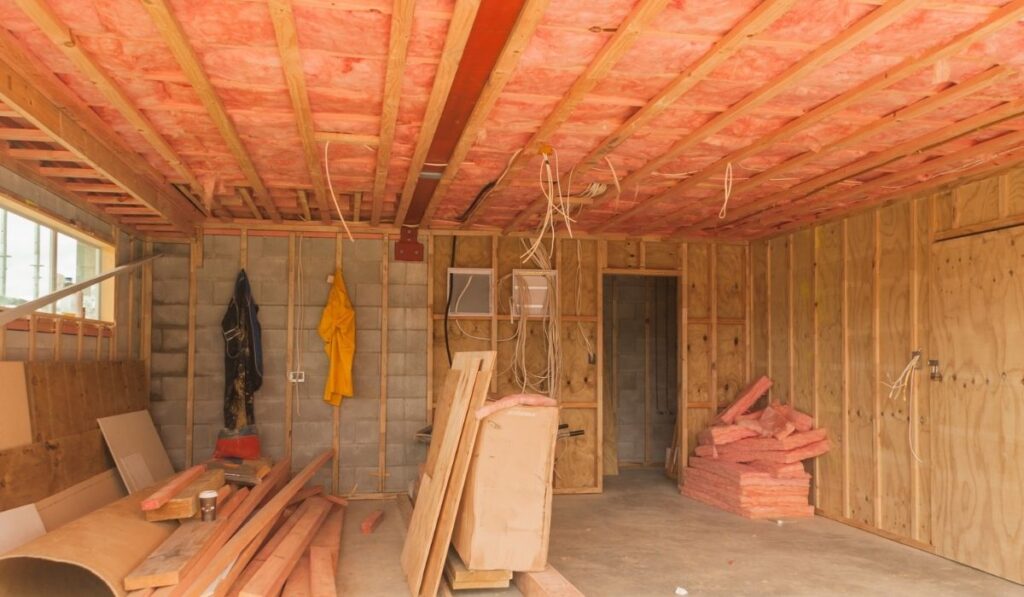Insulating above your garage is the most effective way to maintain the desired temperature inside your garage or in the room above it. However, garage ceiling insulation can be expensive, and it’s probably not worth it unless you meet certain conditions.
You should insulate your garage’s ceiling if your HVAC system extends into the garage or there’s a room above the garage. You can use loose-fill insulation or fiberglass batting for most of it and then fire-blocking caulk or spray foam for any gaps. Your garage door and walls can be insulated, too.
Insulating your garage doors and walls will help keep the garage cool in the summers and warm in the winters. It will also prevent air leakage through cracks or holes.
Should You Insulate the Area Above Your Garage?

While insulating the top of a garage helps with keeping the temperature stable, it’s important to know whether or not it’s worth the effort.
If the HVAC system of your house extends into the garage, then the top of your garage should definitely be insulated. Insulating above your garage also makes sense if you have an air-conditioned room above your garage.
However, insulating above your garage can be expensive. Experts estimate that ceiling insulations can cost anywhere from $1,700-$2,100. Therefore, if you do not have the above-mentioned circumstances, there’s no need to insulate above your garage because it’s probably not worth it.
Other than costing money, insulation can also take a lot of time and effort. Organizing a professional team of contractors to carry out the insulation process is not a simple task. You need to make sure the insulation is worth all that effort!
When Should You Insulate Your Garage Ceiling?
If you plan to have an air-conditioned garage, you will need to insulate over it. If you don’t insulate it, all the air will simply rise up through the ceiling and out of the roof.
Secondly, you need to insulate if you have another room over the garage.
During summer, the heat from the garage can rise through the ceiling and the roof into the room above the garage. To prevent this, you should insulate the top of the garage. Insulation becomes especially useful if the room above is air-conditioned.
Lastly, you should insulate your garage ceiling if your home’s HVAC system extends into it.
How to Insulate Above Your Garage
Ideally, the insulation process should be done while your home is being built. This is the most effective and efficient option. However, you might find yourself needing to insulate above your garage long after the construction is completed.
You have the option so loose-fill insulation, which is typically made of fiberglass or cellulose fiber. This can be installed using rented machines.
Another material that can be used is fiberglass batting, which is a flexible insulation material that comes packed in rolls. The fiberglass batting can be applied by securing it between studs and joists within the frame.
For small gaps of about 1/4 inches or less, you can use fire-blocking caulk. For gaps that are slightly bigger (1/2 inches), you can use fire-blocking spray foam. As for chimneys and flues, you can use high-temperature caulk or furnace cement.
Other Types of Garage Insulation

While it’s only recommended to insulate your garage’s ceiling if there’s a room above it or if you’re planning to install an air conditioning system, you can still insulate it in other ways, even if you don’t meet those conditions.
Garage door
Another one of the areas you can insulate is your garage door. The garage door typically tends to have small gaps and cracks, and these tiny spaces allow air to come in. This might not necessarily be a problem in the winders; however, in summers, it can become an issue.
Insulating the Garage door can also help in making the door quieter, keeping the garage cool during the summers and warm in the winters. Furthermore, garage door insulation will also help you heat up or cool down your garage faster from the inside.
Garage walls
Your garage walls can also be insulated. Wall insulation can especially be useful if your walls have cracks or tiny holes. Garage wall insulation can therefore help prevent a kind of air leakage through your walls. Insulating the adjoining walls between your house and the garage can also prove to be fairly energy efficient.
However, with that said, the garage wall insulation doesn’t play a significant role in controlling temperatures if the walls are perfectly sealed and free of any cracks or holes.
